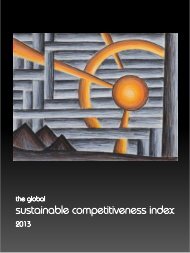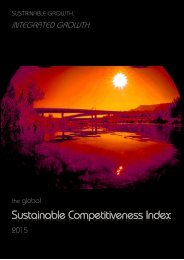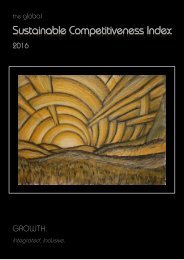The Global Sustainable Competitiveness Index 2019
Measuring competitiveness comprehensively: Sweden & Scandinavia tops, Germany #15, UK 17, US 34, China 37 in the Global Sustainable COmpetitiveness Index 2019
Measuring competitiveness comprehensively:
Sweden & Scandinavia tops, Germany #15, UK 17, US 34, China 37 in the Global Sustainable COmpetitiveness Index 2019
You also want an ePaper? Increase the reach of your titles
YUMPU automatically turns print PDFs into web optimized ePapers that Google loves.
Executive Summary
Table of
Contents
1 Sustainable Competitiveness
What?
The Global Sustainable Competitiveness Index (GSCI) measures the total
competitiveness – now, and the potential into the future – of nation-economies.
It is based on 116 quantitative – not qualitative! - indicators to exclude any
subjectivity.
Sustainable competitiveness is the ability to generate and sustain inclusive
wealth without diminishing the future capability of sustaining or increasing
current wealth levels.
The GSCI is the most comprehensive measurement of the competitiveness of
nation-states - both as-is, and with respective to future potential.
Why?
GDP and other measurements based on economic indicators do not measure
real competitiveness. To counter the lack of integral competitiveness
measurement of nations, the GSCI integrates all three dimensions of sustainable
development: the environment, the society, the economy. Because
development that is not sustainable is not development. It is called regression.
How?
The GSCI is based on 116 measurable and comparable quantitative indicators.
Quantitative indicators can be measured and exclude subjectivity associated
with qualitative indicators. The methodology was originally developed based on
ESG frameworks to evaluate corporate sustainability.
The sustainable competitiveness model is based on 5 pillars of equal
importance:
Natural Capital: the given natural environment,
including the availability of resources, and the level of
the depletion of those resources.
Social Capital: health, security, freedom, equality and
life satisfaction within a country.
Governance
Resource Management: the efficiency of using
available resources as a measurement of operational
competitiveness in a resource-constraint World.
Intellectual Capital: the capability to generate wealth
and jobs through innovation and value-added
industries in the globalised markets
Resource
efficiency
Sustainable
Competitive
Intellectual
Capital
Governance Efficiency: Results of core state areas and
investments – infrastructure, market and employment
structure, the provision of a framework for sustained
and sustainable wealth generation
Social
Capital
Natural
Capital
4








